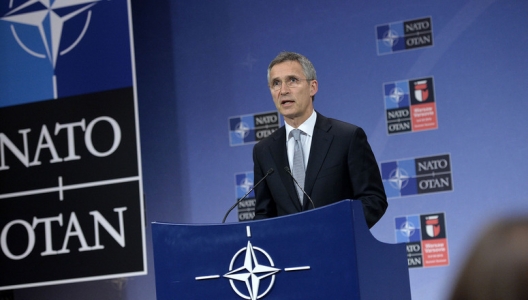 Collective defence is NATO’s primary responsibility. Our nearly one billion people expect that we will keep them safe. To further boost our security, NATO leaders agreed last week in Warsaw to enhance our military presence in the eastern part of the Alliance. We will deploy four multinational battalions in Estonia, Latvia, Lithuania and Poland on a rotational basis. These forces will make clear that an attack on one Ally will be met by forces from the whole Alliance. And we agreed to increase our presence in south-eastern Europe, based on a multinational brigade in Romania.
Collective defence is NATO’s primary responsibility. Our nearly one billion people expect that we will keep them safe. To further boost our security, NATO leaders agreed last week in Warsaw to enhance our military presence in the eastern part of the Alliance. We will deploy four multinational battalions in Estonia, Latvia, Lithuania and Poland on a rotational basis. These forces will make clear that an attack on one Ally will be met by forces from the whole Alliance. And we agreed to increase our presence in south-eastern Europe, based on a multinational brigade in Romania.
Some fear these measures are leading toward a tit-for-tat escalation with Russia. I understand those concerns, but I do not share them. We want to prevent conflict, not to provoke it. All of NATO’s measures are defensive, proportionate, transparent and fully in line with our international obligations. NATO is and will always be a defensive alliance. The core of our strengthened defence posture is aimed at countering security threats from all directions. NATO poses no threat to Russia or to any other country. We do not seek confrontation or a new arms race. The Cold War is history and it should stay history.
Despite our differences, it is essential that we engage constructively with Russia. After all, Russia is a permanent member of the United Nations Security Council. Russia cannot and should not be isolated. Russia can play a constructive role in world affairs, as shown by the Iran nuclear agreement and the destruction of Syria’s chemical weapons.
Dialogue with Russia is important to promote strategic stability, predictability and transparency. We need dialogue to clearly communicate our intentions, our initiatives and our expectations to Russia, and vice versa. We need dialogue to reduce the risk of incidents and accidents spiralling out of control. The downing of the Russian fighter plane over Turkey last year underlines how urgent this is. And I welcome the fact that Russia has signalled that it wants to pursue confidence building measures to improve air safety.
Dialogue is also important for communicating and reinforcing clear principles and international norms of behaviour, like the sovereignty of nations and the sanctity of internationally recognized borders. These values are fundamental for European security. That is why NATO will never accept Russia’s illegal annexation of Crimea and why we fully support Ukraine’s sovereignty and territorial integrity….
Given the complex and challenging security environment we face today, I believe NATO’s two-track approach toward Russia is the right one. We need more defence and more dialogue. NATO is delivering both.
The author is NATO Secretary General Jens Stoltenberg. This opinion-editorial was published in newspapers belonging to LENA (Leading European Newspaper Alliance).
Image: Secretary General Jens Stoltenberg, July. 13, 2016 (photo: NATO)
